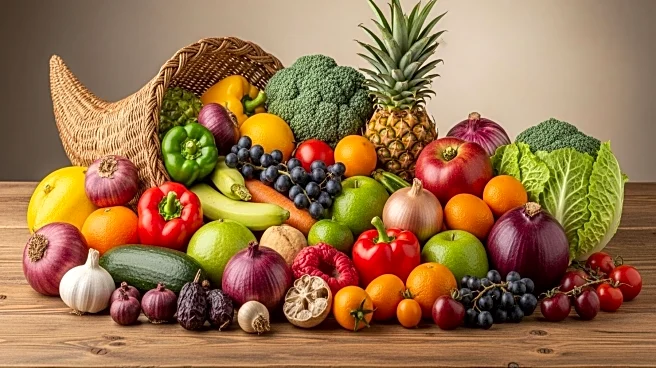What's Happening?
The International Food Policy Research Institute (IFPRI) has released its 2025 Global Food Policy Report, marking its 50th anniversary. The report reviews five decades of progress and challenges in global food systems. Johan Swinnen and Purnima Menon discussed the report in a VoxDevTalks podcast episode, highlighting significant improvements in food security and poverty reduction from the mid-1970s to a decade ago. However, they noted a concerning reversal in these trends over the last decade. The discussion emphasized the need for evolving policies to build resilient, inclusive, and sustainable food systems. Menon pointed out the potential of new innovation systems in emerging economies and international collaboration to address these challenges.
Why It's Important?
The findings of the IFPRI report are crucial for understanding the current state and future direction of global food systems. The reversal in food security and poverty reduction trends poses significant challenges for policymakers and stakeholders in the agriculture sector. Addressing these issues is vital for ensuring sustainable development and improving global health outcomes. The report's emphasis on innovation and collaboration highlights the importance of leveraging research and knowledge to develop effective strategies. This has implications for U.S. agriculture policy, as it underscores the need for international cooperation and adaptation to changing global conditions.
What's Next?
The IFPRI report suggests that stakeholders in the agriculture sector must engage with the knowledge community to identify best practices for building resilient food systems. This involves fostering international collaboration and innovation to address the challenges highlighted in the report. Policymakers may need to consider new strategies and policies to reverse the negative trends in food security and poverty reduction. The report could influence future discussions and decisions in U.S. agriculture policy, particularly in terms of international trade and collaboration.
Beyond the Headlines
The report's findings raise ethical and cultural questions about the global food system's sustainability and inclusiveness. The reversal in progress over the last decade suggests that previous strategies may not be sufficient to address current challenges. This calls for a reevaluation of existing policies and practices, considering the long-term impacts on global health and development. The emphasis on innovation and collaboration highlights the need for a more integrated approach to food policy, which could lead to significant shifts in how food systems are managed globally.










